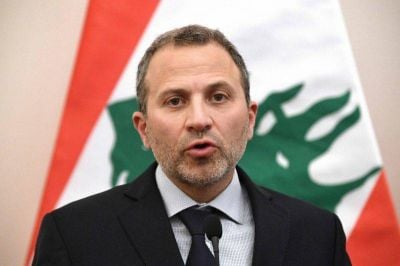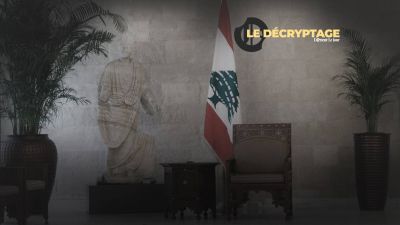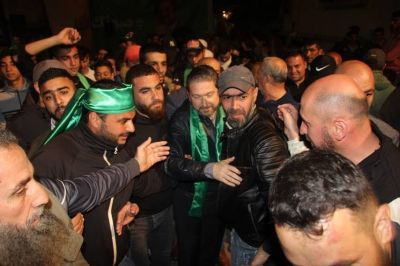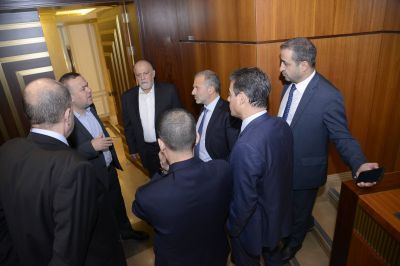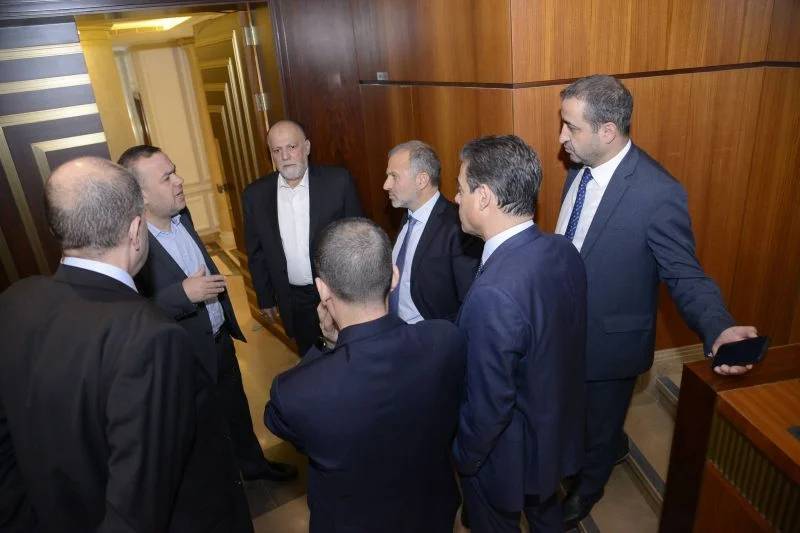
On the sidelines of Thursday’s session, Hezbollah MP Hassan Fadlallah chats with FPM leader Gebran Bassil with Hezbollah’s Ali Ammar and Aounists Nicolas Sehnaoui, Salim Aoun and Ghassan Atallah. (Credit: Parliament’s Flickr account)
It’s a tie. At the end of the ninth parliamentary session dedicated to electing a new president — which once again hit a brick wall due to the lack of quorum caused by the withdrawal of the March 8 MPs — the blank ballot advocated by the Hezbollah camp is for the first time no longer in the lead.
Dropping from 52 votes in the eighth session to only 39 this time, the nameless ballots tied with those of the main opposition candidate, the MP from Zgharta Michel Moawad. This readjustment comes while tension prevails between Hezbollah and its Christian ally, Gebran Bassil’s Free Patriotic Movement, which wanted to send a clear and unambiguous message to Hassan Nasrallah’s party.
‘Equal’
The drop in the number of blank ballots to its lowest since the beginning of the election period in September has been a blow to Hezbollah’s presidential strategy, which consists of remaining on a neutral ground until a compromise takes shape, at least within the March 8 camp itself.
The Iran-backed party and its allies have still not managed to agree on a candidate. While Amal and Hezbollah prefer Marada leader, Sleiman Frangieh, the FPM head wants to have his say, since he chairs a large Christian parliamentary bloc. Until further notice, Bassil refuses to endorse the choice of the other March 8 members, especially since he is known for his animosity to the zaim of Zgharta.
If this presidential dispute has been the source of tension between the two signatories of the Mar Mikhael MoU for several weeks, Monday’s controversial cabinet meeting was the straw that (nearly) broke the camel’s back. The FPM could not count on the support of Hezbollah’s ministers to torpedo the session convened by caretaker Prime Minister Najib Mikati, which it considers unconstitutional in the absence of an elected president. In a speech the next day Bassil threatened to “deviate from the blank vote” as soon as possible, while his MPs indicated that they intended to break with this strategy to “impose” Frangieh.
A promise is a promise. “We did not all cast a blank vote. We distributed the roles in order to create a tie” between the Hezbollah camp and the opposition, MP Cesar Abi Khalil (FMP/ Aley) told L’Orient-Le Jour.
Among the FPM MPs, then, three voted for ex-customs director Badri Daher (close to the FPM, and currently imprisoned in the Beirut port explosion case), while four cast ballots (which were ultimately disallowed) with only the name or surname of Michel Moawad. The message could not be clearer.
Why didn’t the Strong Lebanon MPs go all the way in their challenge? “To show Hezbollah that we are keeping our options open,” said an FPM official on condition of anonymity. Remarkably, while Bassil went to Parliament, he did not cast a ballot and on his way out quickly told reporters, “equal” — a reference to the tie between the two sides.
“We wanted to send a message to Hezbollah to show our disagreement with its recent positions,” said the FPM official. It may indeed be a way for Bassil to tell Hezbollah that it will not be able to dominate Lebanese political life without its support and without the Christian cover it provides. But the FPM is clearly not ready to cut the cord with its only ally in the political arena, nor to face the consequences that might ensue.
“It is not a matter of causing a rupture with Hezbollah and many of our MPs cast a blank vote,” said the official, who added that meetings are underway between the two parties’ officials to calm the tensions. Already on the sidelines of yesterday’s session, Hezbollah MPs Hassan Fadlallah and Ali Ammar met with Bassil.
Slight increase for Michel Moawad
Moawad tied with the blank ballot, obtaining 39 votes. Including six of his supporters who did not attend the session (Salim Sayegh, Waddah Sadek, Sethrida Geagea, Melhem Riachy, Camille Chamoun and Neemat Frem), the MP for Zgharta has the support of 45 MPs in total, two more than in the last session, in which he recorded a significant decline. “We got two votes from the National Moderation bloc [mainly composed of Sunni ex-Hariri MPs],” said the MP for Koura Adib Abdel Massih, who is close to Moawad. Since the beginning of the presidential selection process, these MPs have cast a vote for “new Lebanon,” waiting for a compromise. This time, nine MPs voted for “new Lebanon,” the same number as last time. Yet two MPs were absent from their ranks.
“Moawad is for us a very good candidate, and some of our MPs vote for him from time to time because he has all the criteria we are looking for,” said Walid Baarini, a Sunni MP from Akkar and a member of this bloc. “However, we feel that he has no chance of being elected, since he is not regarded as a compromise candidate.”
Weakened by the lack of solid leadership since Saad Hariri’s withdrawal from politics in January, Sunni MPs fear being left out of a possible presidential compromise, especially if they openly support a battle that may not succeed. This is especially the case since Moawad’s candidacy is vetoed by Hezbollah, which sees him to be too uncompromising.
“We don’t like to lose,” Nabil Badr, a Sunni MP from Beirut, told the media as he left the session.
Proof of the division in the opposition’s ranks was evident from the fact that their votes were so widely scattered. Aside from the ballots cast for Moawad, Issam Khalifeh got five votes (those of Saida MP Oussama Saad and four of the protest movement MPs) and Ziad Baroud, the former interior minister, got one vote (that of Elias Jaradi, protest movement MP from the South). One vote was cast for the declared candidate Fawzi Bou Malhab. Notably, former independent MP Salah Honein obtained a vote for the first time — that of Michel Douaihy, MP for the protest movement.
This story was originally published in French in L'Orient-Le Jour, translated by Joelle Khoury.
